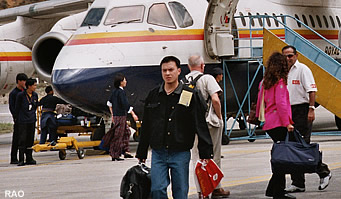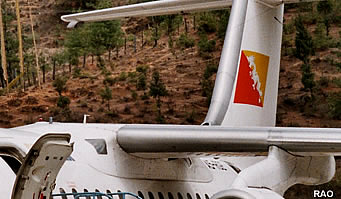 |
Bhutan's
Tourism |
|
|
|
 |
|
2007:
Under 'cutting' the industry
|
 |
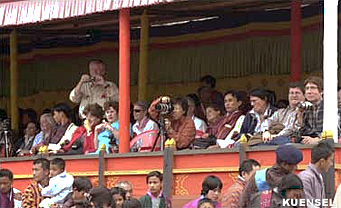 |
| Tourists at a festival |
| Months
before the season approaches, tour operators spend hours online exchanging
mails with tour agents within the region and abroad. Deepak, who has barely
been a tour operator for a year, sits glued to his computer in his residence
cum office in Thimphu town.
He
replies to a tour agent in Nepal who had offered to send a group of tourists
from Nepal to Bhutan through him for a certain commission. While he sends
the agent his package and rate he asks for a few more days to think about
the offer. |
|
Two
days later the agent in Nepal has written again. The deal has been given
to another tour operator in the country willing to pay the agent more commission.
Deepak
has been "undercut", a practice that is rampant and unhealthy for the industry
but which many tour operators cannot avoid to stay in the business.
For
the government undercutting has no impact because it dutifully collects
40 percent of US $ 200 a day peak season charge, as royalty.
But
where it could impact and has an impact is in the quality of services.
Depending on the commissions offered operators cut corners to make their
margin and also offer the services that the tariff covers. That includes
hotel, food, transport and guide.
"Although
I am willing to offer 10 percent commission to the agents abroad or within
the region, agents prefer the bigger companies," said a fresh tour operator.
"They provide a better commission and are in a position to offer better
services."
Deepak
said that the established tour companies could afford to reduce the tariff
as low as US $ 130.
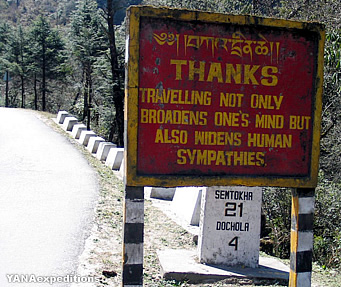 |
| An
official from one of the big tour companies said that undercutting was
prevalent both among the big and small tour operators.
He
said that they did extend commissions to the agents beginning with 10 percent,
which increased to 20 and 30 percent depending on the business generated
by the agents. Discounts were also given depending on the size of the group
and duration of stay.
The
managing director of Etho Metho tours and treks, Dago Beda, however, argues
that undercutting was not feasible in the present context where hotel rents
had shot up, transportation costs had increased and there were more tour
operators. |
|
"For
all that reasons we are charging our tourists more than the base price
of US $ 200 a person a day.
An
official from one of the big tour companies said that undercutting was
prevalent both among the big and small tour operators.
He
said that they did extend commissions to the agents beginning with 10 percent,
which increased to 20 and 30 percent depending on the business generated
by the agents. Discounts were also given depending on the size of the group
and duration of stay.
The
managing director of Etho Metho tours and treks, Dago Beda, however, argues
that undercutting was not feasible in the present context where hotel rents
had shot up, transportation costs had increased and there were more tour
operators.
"For
all that reasons we are charging our tourists more than the base price
of US $ 200 a person a day. So there is no question of under cutting,"
said Dago Beda. "That's an old story."
The
tourism department's director general, Lhatu Wangchuk, also believes that
undercutting may not be feasible, especially, with hotel standards having
gone up.
He
also agreed that such practises generally led to compromises on services,
especially meals. That, he said, was one of the reasons why the country
was named as having the worse foods in the world. "Which is not true, because
we have one of the best cuisines in the world," Lhatu Wangchuk said.
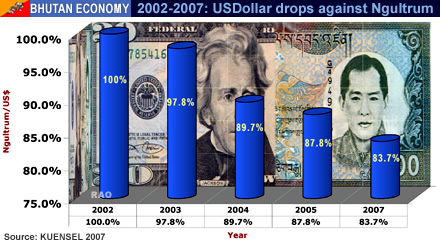 |
| A
tour operator pointed out that they had no option but to tie up with operators
in the region because tourists visited Bhutan as part of a regional package.
Those visiting Bhutan exclusively were few and came through niche markets.
With
more than 200 operators in the country the practice was getting tighter,
he said. |
|
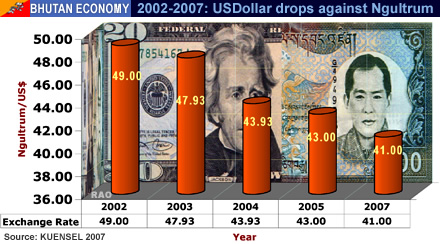 |
| The
tourism department's joint director, Thuji Dorji Nadik, attributes the
substantial increase in the tourist arrivals to undercutting. "
There
is nothing to feel good about the increase in tourist arrivals in the country
since the revenue staying back is quite low. The only actual revenue is
the royalty," he said.
Thuji
Dorji Nadik said that undercutting in tourism worked both ways. |
|
The
smaller tour operators pointed fingers at bigger tour operators with economies
of scale and vertical integration, which placed them in a comfortable position
to offer discounts.
The
bigger tour operators argued that it is the smaller ones engaging in the
undercutting because they had no overheads or an office and staff to pay.
But
he pointed out that it could be more prominent among the small tour operators
since they had nothing to lose, unlike the bigger operators who had a reputation
and credibility to maintain and overheads to pay.
Small
tour operators, he said, brought in just two to three tourists a year which
was a bonus for them because it was not even a means of livelihood for
them, but a supplement income. "They are fly-by-night operators," said
Thuji Dorji Nadik. "We want to discourage that."
In
recent months, tourism officials said that, they received a number of complaints
from tourists, some of whom even cut short their trips and returned, against
the small tour operators because of poor services.
Thuji
Dorji Nadik pointed out that it was a complicated situation where on the
one hand they were trying to provide employment opportunities to as many
people while on the other too many of the "unscrupulous" or "unethical"
tour operators came into the business.
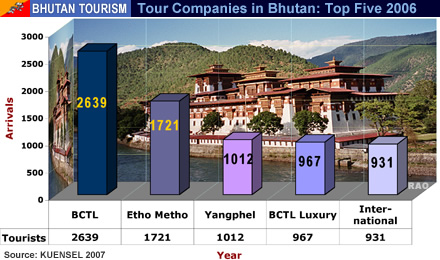 |
| "This
could be disastrous to the industry," he said. "That only creates room
for unprofessional and poor tour packages."
A
consultant for Department of Tourism said that in the 90s Bhutan was considered
an expensive product selling itself as high value, low volume tourist destination,
consciously excluding backpackers who roamed neighbouring countries like
India and Nepal. |
|
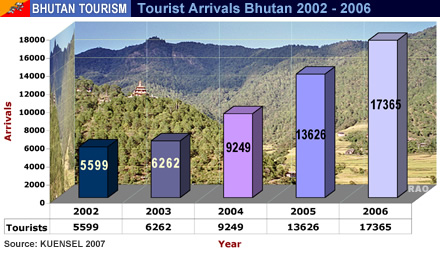 |
| "It
is no longer an expensive destination," he said. "It is a lot cheaper than
many other destinations in the world."
He
said that in 1991 when he first visited the country, there were only over
1,700 tourists and that the number had increased by 1,000 percent today. |
|
"Bhutan
has lost that value of being an exclusive destination," he said, adding
that the country should increase its tariff, which has remained stagnant
at US $ 200 for the last 17 years or so.
"US
$ 200 is peanuts," he said. "In UK even a hotel charges a minimum of 200
pounds a night."
According
to tourism officials, the base price would soon be increased by 15 to 20
percent and encourage tour operators to get a bit more innovative and imaginative
and try doing things like weddings and honeymoon.According to tourism officials,
the base price would soon be increased by 15 to 20 percent and encourage
tour operators to get a bit more innovative and imaginative and try doing
things like weddings and honeymoon.
| Contributed
by Samten Wangchuk, KUENSEL, Bhutan's national newspaper, 2007 |
 |
|








